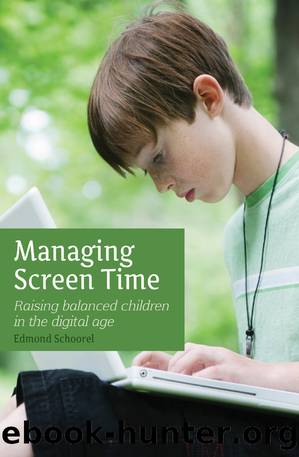Managing Screen Time: Raising Balanced Children in the Digital Age by Edmond Schoorel

Author:Edmond Schoorel
Language: eng
Format: epub
ISBN: 9781782502579
Publisher: Floris Books
Connectedness
Connectedness is quite different. It involves feeling so closely related to other people that we can feel and act on their behalf. The word âloveâ would fit here as well. Love is something that increases when we share it; in the realm of love we become richer when we give. There are a couple of obvious areas where we can practise connectedness. The bond most parents experience with their children is based on connectedness (or love). This is quite different from âlikingâ or feeling âsympathyâ. Love is the reason most parents of unsettled babies who never get to sleep through the night donât throw their children out! Children are also connected with their parents in this unconditional manner, and in a sense also with their brothers and sisters. With them we learn that we are unconditionally connected to human beings who we can also find immensely annoying!
Another situation in which we develop connectedness is, of course, being in love. Being in love may make us blind, but it also makes us clairvoyant. Love makes it possible to look through the outside and see the hidden inside: we want to merge with each other, be absorbed by each other, and are willing to do anything to be with each other. That is the power of being in love, and thatâs why some people get addicted to it. For many people the feeling of being in love ebbs away and is replaced by faithfulness. Faithfulness is also a form of more or less unconditional connectedness.
We can measure the stature of peopleâs humanity by the extent of their circle of connectedness. People with a large circle of connectedness are peacemakers. Why is it so difficult to expand our circle in this way? Why donât we all have a large circle? It could after all be a way to peace. I think the most important reason is that we assume responsibility for people we take into our circle of connectedness. For example, a girl might stick up for her little brother in the playground, whereas at home heâs a brat and she wonât go near him. In the same way we feel responsible â no, we are responsible â for the people in our circle. Parents acquire this responsibility, which rests on trust, through the birth of their child. A similar trust is necessary for real connectedness.
Download
This site does not store any files on its server. We only index and link to content provided by other sites. Please contact the content providers to delete copyright contents if any and email us, we'll remove relevant links or contents immediately.
Spare by Prince Harry The Duke of Sussex(5175)
Navigation and Map Reading by K Andrew(5150)
Tuesdays with Morrie by Mitch Albom(4769)
Machine Learning at Scale with H2O by Gregory Keys | David Whiting(4292)
Cracking the GRE Premium Edition with 6 Practice Tests, 2015 (Graduate School Test Preparation) by Princeton Review(4277)
Never by Ken Follett(3937)
Goodbye Paradise(3798)
What It Really Takes to Get Into Ivy League and Other Highly Selective Colleges by Hughes Chuck(3744)
Fairy Tale by Stephen King(3370)
Harry Potter and the Prisoner of Azkaban (Book 3) by J. K. Rowling(3346)
Pledged by Alexandra Robbins(3170)
Kick Ass in College: Highest Rated "How to Study in College" Book | 77 Ninja Study Skills Tips and Career Strategies | Motivational for College Students: A Guerrilla Guide to College Success by Fox Gunnar(3116)
Reminders of Him: A Novel by Colleen Hoover(3092)
A Dictionary of Sociology by Unknown(3073)
Sapiens and Homo Deus by Yuval Noah Harari(3064)
The Social Psychology of Inequality by Unknown(3018)
Graduate Admissions Essays, Fourth Edition: Write Your Way into the Graduate School of Your Choice (Graduate Admissions Essays: Write Your Way Into the) by Asher Donald(2907)
Will by Will Smith(2907)
Zero to Make by David Lang(2777)
